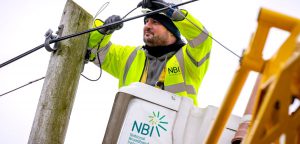Source: Techbuzz Ireland
As a nation continues to work from home, with many not seeing a return to office life until sometime in 2021, if at all, it would seem our while technical abilities as a nation are standing to us, poor broadband in areas throughout the country is letting us down. In the latest Taxpayer Sentiment survey conducted by tax refund specialists Taxback.com, 51% of over 2,500 respondents from all over Ireland said they had experienced technical issues due to poor quality broadband in their home since lockdown was first implemented back in March.
Speaking of the findings, Marian Ryan, Consumer Tax Manager at Taxback.com,
“Many of the working population have had to adapt to a new way of working, with the lockdown resulting in 34% of the workforce having to work from home and 12% increasing their number of hours remote working from home[1] since April. This has led to an increase in the use of technology for work, with far more video conferencing and online meetings and training being used now than ever before in many workplaces. As we no longer have the office IT department on hand, or even a colleague who we deem a bit more tech savvy than ourselves to ask questions of when our tech lets us down, we were interested to get a glimpse into how the nation was coping with this adjustment.”
The Taxback.com survey sought to gain insight into how differing levels of broadband provision around the country is impacting people’s experience of working from home. Respondents were asked the following:
Have you experienced technical issues due to poor quality broadband in your home since the start of lockdown?
- Yes – I live in a rural location – 20%
- Yes – I live in a small city or town – 17%
- Yes – I live in a major city – 14%
- No – I live in a small city or town – 21%
- No – I live in a major city – 16%
- No – I live in a rural location – 12%
Ms. Ryan commented,
“One area that is really letting many of us down at the moment is poor quality broadband services, which the pandemic has brought into sharp focus. The results are split almost 50:50 between those who say they have experienced issues and those who haven’t, but what is interesting is the breakdown of where those who experience issues are located. 37% of those who reported issues were located in rural areas and towns, and a further 14% were located in major cities. Unsurprisingly, it’s our colleagues who live outside the major cities who are most likely to suffer. This shows just how the unequal distribution of broadband around the country works to facilitate and create opportunity for some, but not for others. The ability to work or learn from home effectively is very much determined by where you live.”
The survey also asked the following question:The lockdown has led to an increase in the use of technology for work, with more mobile conferencing and video software etc. being used – people have had to adapt to using new tech that they may not have been using before – how tech savvy do you think you are?
- I have enough to get by – 45%
- I have the basics but should learn more – 26%
- Very savvy I’m a tech whizz – 18%
- I have upskilled during this time – 6%
- I’m not savvy at all – a total technophobe – 5%
Ms. Ryan commented,
“Working from home has meant that more of us have had to get through the tech obstacles that we all too often avoid or ignore because we have another space to go to with better infrastructure or services. On the whole however, it seems Ireland has a pretty technologically minded workforce, with survey results revealing that the majority (45%) of people feel they have enough IT skills to get by, and 26% of us feeling ‘we have the basics, but need to learn more’. Up to 18% believe that they have excellent IT skills and deem themselves a ‘tech whizz’, and only 5% felt they were ‘total technophobes’. Interestingly, 6% of respondents said that they had upskilled during the lockdown period.”
Ms. Ryan concluded,
“Our communications infrastructure around the country is the big challenge, and this is not something that an individual can, or can even be expected to, tackle themselves. But from a wider standpoint, it gives weight to the argument that rural and local economies will continue to suffer if we can’t put the structures and systems in place to allow business to carry out fairly basic, but very necessary, functions like operating online. The need for quality rural and regional broadband is clearer than ever in light of Covid-19, and the National Broadband Plan, which is currently in Phase 1 of its roll out, will go a long way to tackling and hopefully reversing this inequality into the coming years.”



